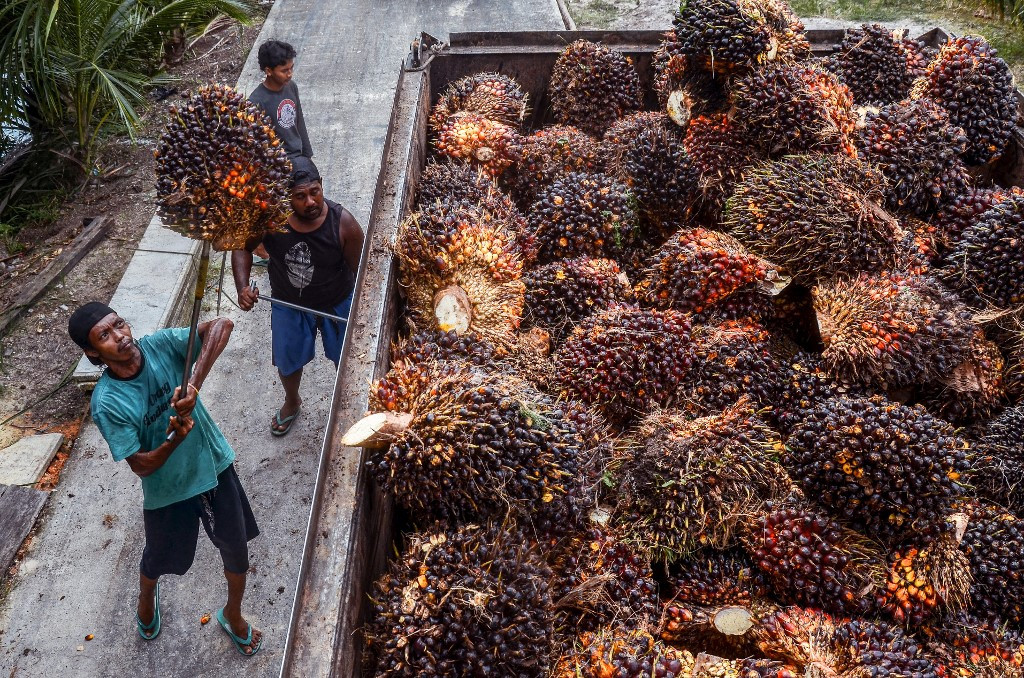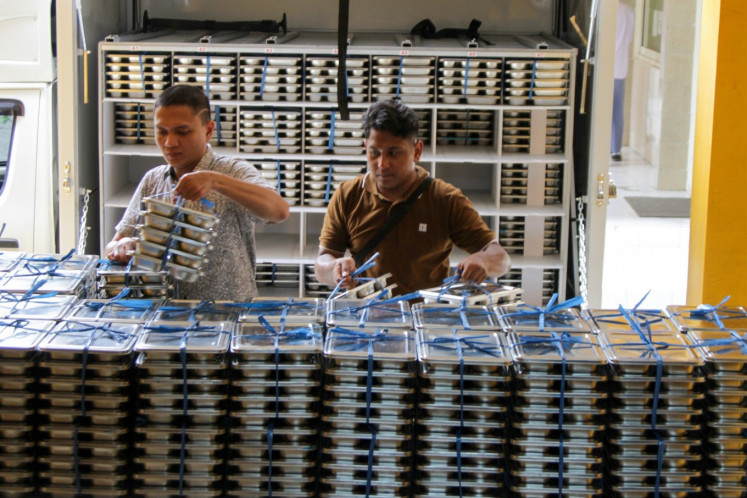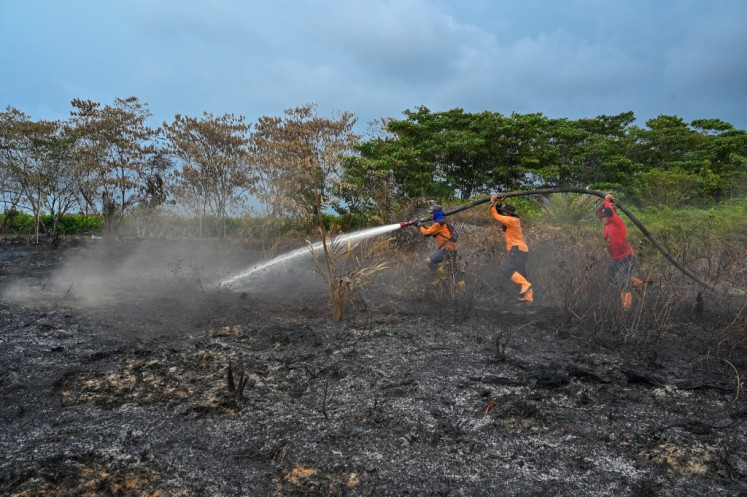Palm oil export ban will hurt us, farmers warn
Fresh fruit bunch price plummets even before policy takes effect.
Change text size
Gift Premium Articles
to Anyone

I
ndonesian farmers fear the government-imposed ban on palm oil exports will see fresh fruit bunch (TBS) prices free fall amid an expected domestic supply glut.
Henry Saragih, chairman of the Indonesian Farmers Union (SPI), said some regions had seen TBS prices drop 30 percent to 50 percent since the crude palm oil (CPO) export ban was announced last Friday.
He cited figures reported by palm oil farmers in Riau and North Sumatra that TBS prices in those areas had declined to between Rp 1,700 (12 US cents) and Rp 2,000 per kilogram.
With the ban yet to take effect, Henry expects excess supply to cause TBS prices in the country to decline further.
According to 2021 data, only 16.29 million tons out of a total 46.89 million tons of CPO produced in the country were absorbed by domestic buyers, whereas almost twice as much, namely some 30 million tons, was shipped abroad.
Aside from cooking oil, palm oil is used in a wide range of products, such as other foods, cosmetics and cleaning products, as well as in the production of biofuels.
A current worldwide shortage of alternative cooking oil ingredients has driven up the price of cooking oil and of CPO in particular, but farmers in Indonesia, the world’s foremost CPO producer and exporter, will fail to reap the benefits of high global demand once the export ban kicks in.
“The ban will certainly impact oil palm farmers,” Henry said in a statement published on Monday.
CPO is the paramount ingredient for cooking oil in Indonesia and a major source of export revenue for the country. The government’s export ban announced last Friday extends beyond palm oil to cooking oil and other cooking oil ingredients.
The measure was presented as necessary to ensure domestic supply and low prices of the staple ingredient in local cuisine.
Henry suggested that the government formulate a policy on CPO derivatives that would ensure TBS prices remained stable and reasonable amid the CPO export ban.
The country’s exports of palm oil and its derivatives typically amount to $3 billion a month, according to some analyst estimates.
The export ban came only two days after the Attorney General’s Office (AGO) detained a senior Trade Ministry official and three corporate executives over alleged violations related to palm oil export permits. The executives are from private cooking oil producers Permata Hijau Group, PT Wilmar Nabati Indonesia and PT Musim Mas, all members of the Indonesian Palm Oil Association (Gapki).
Read also: Palm oil crisis shakes up Indonesia's politics, global supplies
Palm Oil Smallholders Union (SPKS) chairman Mansuetus Darto said that while TBS prices varied from one region to another, there had been a considerable decrease following the export ban announcement as palm oil producers reduced TBS prices by around Rp 400 per kilogram in South Kalimantan and Rp 500 per kilogram in Jambi.
“Corporations with an export contract are put at a disadvantage, and they’re taking it out on the farmers by buying oil palm fruit bunches at cheaper prices,” he said in a statement, also on Monday.
Palm oil producers see share prices fall
Shares of some of Indonesia’s biggest palm oil companies slumped on Monday while the rupiah fell in Asia after the government announced the ban.
The rupiah, which had been relatively stable this year, propelled by record-high Indonesian exports, was down as much as 0.65 percent during trading on Monday.
The currency’s exchange value was affected by the export ban, as well as by hawkish comments from United States Federal Reserve officials portending a tighter monetary policy by the US central bank, according to Edi Susianto, the head of Bank Indonesia's monetary management department, as reported by Reuters.
Shares in Indonesia’s Astra Agro Lestari and Triputra Agro Persada suffered losses of more than 6 percent. Salim Ivomas Pratama and Sinar Mas Agro Resources and Technology also dropped, while shares of Singapore-listed Wilmar International saw a more limited fall.
Read also: Global edible oil markets simmer after shock Indonesia ban
Global vegetable oil prices climbed on Monday to trade near multiyear highs as Indonesia’s decision to ban palm oil exports heightened concerns about global food supplies.
The benchmark palm oil contract for May delivery on the Bursa Malaysia Derivatives Exchange jumped 8.13 percent to 7,430 ringgit per ton on Monday morning, while Chicago soy oil futures hovered near their highest since 2008.
“The destination markets like India, China, Europe and others are bound to be hit by this new policy,” said Anilkumar Bagani, research head of Mumbai-based vegetable oils broker Sunvin Group, as reported by Reuters. “The palm oil prices, except in Indonesia, shall surge due to the export ban.”









